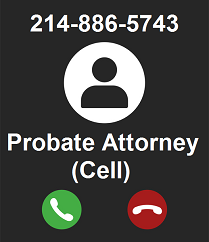Probate: 469.708.6050
Wills & Guardianship: 214.227.6400
13355 Noel Rd., Ste. 1100
Dallas, Texas 75240
Collect Financial Assets
The majority of the Duran Firm probate clients are driven to probate because the decedent had financial assets that did not contain a beneficiary designation. The Duran Firm will make the process of obtaining Letters Testamentary easy. Here are the additional steps you will need to take to collect the financial assets from the decedent's accounts.
Obtain a Death Certificate
Death certificates are usually obtained through the funeral home that is handling the disposition of the decedent's remains. They are approximately $20 for the first copy and $4 for each additional copy. The $20 charge occurs each time you order certificates so it is best to over estimate how many you will need. You should obtain at least one death certificate for each of the decedent's financial institutions and creditors. In today's world, most financial institutions will make a copy of the death certificate, send it to their legal department, and hand the certificate back to you. Sometimes, however, you are forced to mail a copy to the financial institution. Many times you will not receive these back.
Confirm the Assets Belong to the Estate
Nowadays, many financial accounts pass directly to a beneficiary named in the account's opening documents. These "pay on death," "transfer on death" or "joint tenant with right of survivorship" accounts are often referred to by their acronyms, "POD," "TOD," or "JTWROS" accounts which may also appear on the account statements. To find out if the account has a beneficiary, you or the presumed beneficiary should go to the financial institution with a death certificate and ask whether the account has a designated beneficiary. The institution's response will let you know what to do next. If the banker keeps talking to you and asks you where to send "your money", then the account probably had you listed as the beneficiary to the account. If the banker tells you that you need "Letters Testamentary" or "Letters of Administration," then that is a good sign the account did not have a beneficiary and is payable to the estate. If the bank says they cannot speak to you anymore about the account and does not mention the need for Letters, then that is a good sign the account passed to another person as beneficiary (and you are not the beneficiary).
Obtain Letters Testamentary or Letters of Administration
Letters Testamentary are the documents issued by the court to the court-appointed executor or administrator of the estate. Texas law requires executors or administrators to have an attorney apply to the court for Letters. The Duran Firm can help you obtain the Letters from the Court.
Obtain a Taxpayer or Employer Identification Number
The banks are required to report the identity of recipients of any funds the pay out. They way the government keeps track of these persons is through the use of a Employer Identification Number or Taxpayer Identification Number. Simply go to IRS.gov and type "apply for EIN" in the search window. Please reference the following webpage for instructions on how to apply for an EIN for the Estate
Guidance on Applying for an Employer Identification Number for the Estate
Open an Estate Checking Account (Maybe)
Often times the bank will make the check "payable to the estate of {Decedent]." If so, then typically you will not be able to deposit the funds into your personal account. If you are not the sole beneficiary of the account, then you probably do not want to deposit the funds into your personal account anyway because doing so has the appearance of you making an estate distribution of the funds to yourself. Client often ask if they can simply use the decedent's existing account to deposit funds. If the bank will let you deposit funds into the account and let you write checks from the account then using the existing account may be acceptable. Keep in mind, however, that you may not know who else has access to the existing account. What if there is someone out there with a debit card or a signed check? A withdrawal might clear, thus depleting the funds for which you are responsible. Furthermore, having a brand new checking account allows you to easily account for the proceeds under your control. If the beneficiaries want to know what you did with estate funds, you can just hand them the account statements. Thus, the need to establish an estate checking account depends on whether you are the sole beneficiary of the funds, whether additional funds need to go in and out of the account, and whether you are sure that no one else has access to the account.
Retirement Accounts
Special care must be taken regarding the decedent's retirement accounts. Many retirement accounts are tax deferred, meaning the accounts are not taxed until a withdrawal occurs. If you withdraw the decedent's retirement account all at once, you may incur significant income taxes which could be avoidable. Therefore, before acting in regards to any tax defferred accounts, we recommend that you consult with both the financial institution and your accountant to determine if there is a way to "roll over" the account in such a way as to minimize the tax consequences associated with withdrawing the funds from the account.
© 2016-2023 Duran Firm, PLLC
All rights reserved.













